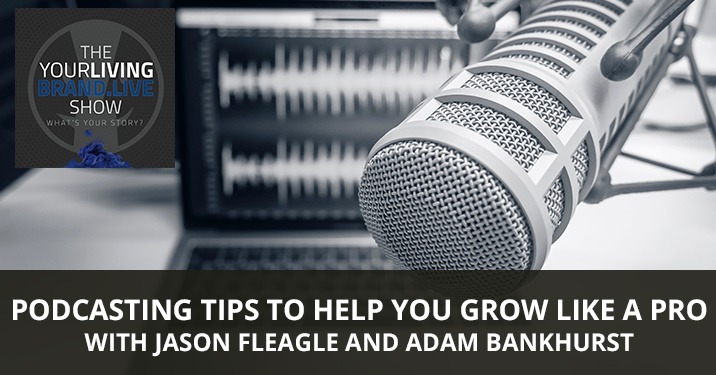
A great podcast is all about asking relevant questions, but how do you know the right questions to ask? Our guests, Jason Fleagle and Adam Bankhurst from the Grow Like A Pro show, run a great podcast and they’re looking to expand their podcast business. Today, Jason and Adam talk about what they’re doing with the show, who their audience is, and what they’re trying to achieve. They also talk about the value of a podcast versus radio and how podcasts help people promote their brand, and give some podcasting tips, tools, and techniques to help people grow like a pro.
—
Listen to the podcast here:
Podcasting Tips To Help You Grow Like A Pro With Jason Fleagle and Adam Bankhurst
Our show is all about how to communicate value. How do you add value to your life and to your customers? How do you communicate that value in a way that people want to listen to and why they care? I’ve got a couple of great guests. Jason and Adam have a show called Grow Like A Pro Show. I was lucky enough to be a guest on their show and we had an absolutely phenomenal conversation. I want to talk to you about something that happened one time and it didn’t make me angry, but it frustrated me because it was a lost opportunity. I brought one of my customers to meet another one of my customers. I do that a lot. I facilitate relationships between my customers. If one of my customers can help another one of my customers, why not introduce people? Why not allow people to have those meetings, and be able to build levels of trust, do some amazing things together? I thought that this was going to be a relationship that was going to be good.
There was a long-term profit that we’re going to solve some problems. Luckily enough, I went to the meeting and I made sure I was there facilitating and fix things up. It concerned me because as soon as I walked in the door and as soon as we sat down, the client that I was introducing to the other client started with a product dump. What I mean by that is, “It was all about me. It was all about we do this and this is what we do. This is how we fix things and this is the technical specs of our product. It was all about us.” They didn’t take the time to get to know the customer and find out what were the concerns, problems, and issues. What are the things that they were trying to solve before they offered a solution? They were so focused on themselves. They were so focused on what they had to sell that they forgot about who they were trying to sell it to. They forgot to try to figure out if there were even a relationship and a reason for them to want to buy their product or even care about them.
Too many companies and too many people do product dumps. It is concerning to me because it is the number one reason why people get turned off in business. People sit there and talk about themselves incessantly and they’re not curious about the people they’re talking to. Be curious about the people you’re speaking to whether you’re in a networking situation, a meeting, with family and friends or whoever. Take the time to find out what people are passionate about. What their issues are. What their concerns are. What they’re working on. What are the things that are important to them first? Gain clues from there. I don’t care what you do for a living. You’re in sales. Every single one of us is selling something whether it’s an idea, a product, sales, trust or getting that first date. We’re all selling in one point or another and in one relationship or another.
The way that you sell the best is to be curious. Ask questions. Think about the other person first and what do they need. What’s important to them? What do they care about? What are they passionate about? What are the things that are keeping them up at night and making them tear their hair out? If we can do that, we have a basis for conversation. Once we understand the other person, empathize with the other person, and realize what their real underlying issues are, we have a much better chance to say, “I get that. I understand that you have this problem. That’s going to cost you a lot of money. We have customers that have similar types of problems. This is how we’ve been able to solve that.” All of a sudden, you’ve gone from selling a widget or product that has a price and either they want it or they don’t want it to be a solutions provider. If you can be somebody that solves problems, creates solutions and make problems go away, it’s no longer about the price.
All of a sudden, people realize, “They understand us. They understand what we’re about and what we need. They understand what our concerns are and what our timeline is. They understand what our budget is and who our clients are in the problems that we’re trying to solve for our clients.” Take even one step forward and that’s what we need to do both in our personal lives and our professional lives within departments. You can do it within your own company. If you’re in sales and you need to talk to the marketing department, find out what their thoughts are. If you’re in marketing and you’re talking to operations people, find out what the concerns for operations are.
Customer experience people talking to the salespeople, find out things from other people’s perspectives. The more we can understand things from other people’s perspective and understand what they need, the easier it is for us to fix those problems. What are the things that we can do to be curious about people? The questions I would ask is, “Tell me about what you’re doing. Tell me about the process. Tell me about the things that are that you’re missing to be able to be successful. What are your goals? What are you trying to achieve? Who are the people that you work with and why do they work with you?” If you can start framing questions in a way that people consider it and say, “They’re curious about me.” They’ll start being curious about you. If they understand that you understand them, you’re building trust. If you don’t have trust, you don’t have anything. The only way to build trust is through relationships.
How do we know what we are missing if we are missing it? How do we know what we don’t know? We all have blind spots. We all have stuff in our life that we don’t know. We don’t know that we don’t know these things. There are things to do with brain surgery. I don’t even know what questions to ask. The question is to be curious about people and have a conversation. Sit there and listen to their answers. When they answer your questions, be ready to think about it. Sit there and say, “What questions come out of the answers to the questions I gave?” The more we can form a conversation, and the more we can’t be listening so we can speak, but we’re listening to listen. The more we can listen to understand and the more we can listen to them say, “I didn’t get that. Did you mean this or did you mean that? You meant that so what does that mean? How does that affect the way that you live? How does that affect the way that you work?” The more we can sit there and say, “I’m not sure. I don’t get it. Can you explain that?” The more you can drill deeper and have a deeper understanding of both the people that you’re dealing with, the companies you’re dealing with, and the friends that you’re dealing with.
—
How do you know the right questions to ask? That’s a great segue to bring in our guests, Jason and Adam, from the Grow Like A Pro Show because they are running a podcast. They have this great podcast and they’re looking to expand their podcast business. Being able to ask relevant questions is all about what it makes a great podcast.
It’s Adam and Jason here. It’s great to be here with you.
How are you? It is great having you guys on the show. We will get into everything but let’s start off with this great question and I want your opinion on it. When you are interviewing people, how do you know the right questions to ask?

We take an interesting perspective and we try to hit both sides of the spectrum. There’s a lot of times where Jason or I will sometimes flip on and off. Jason will research our guests a lot more. He’ll look at the background. He’ll understand what’s going on with that person, their history, and stuff like that. A lot of times we’re going a little blinder. I get a raw reaction or I get questions that maybe a reader would be thinking as they’re reading the interview. We try to give those different perspectives, get from someone who understands what’s going on, and someone who’s reading this information fresh. That’s one of the tactics that we take to try to keep things and we’re not thinking of the same questions or doing the same things over again.
That’s a beautiful thing about teamwork because you can tag-team people. One of you could be walking extremely prepared. You’ve done the research and you’ve taken the time to go through somebody’s website, social media or blog posts online. To be able to drill down to find a little bit more about who they are and what makes them tick. The other one starts to say, “I’m going to listen to what this person is saying while we’re talking.” It’s either you say, “You said that. What do you mean by that?” That’s a great way to do it. Unfortunately, I have to do both because there’s not two of me. I have to split my personality.
That’s why Jason and I sometimes will switch that role, but you have to the preconceived notion when you go in to talk to somebody. Having that fresh perspective is super valuable. Especially as it relates to the audience reading most in a lot of cases in that boat as well.
It’s an organic process. As the conversation unfolds, there are questions that pop into our heads there was like, “That’s interesting.” It’s being curious. Adam and I do a little bit of research, but we like it to be a curious show. We’re being curious ourselves in letting those questions unfold. We asked them to the guests.
We like having a roadmap, but we are not beholden to it. We’re fluid with our questions and if conversations are going one way, we’re not afraid to see where that takes us.
You learn to overcome the challenges that you're facing as you go through the process. Share on XThat’s important to me. When I’m doing this show, I’ll have four or five questions that are prepared. I love that my audience brings in these questions because it takes the conversation a different way. It makes it more relevant to them so it’s a great thing to do. I find that if you have more of a fluid conversation, amazing things come out of it. If you go in with a preset agenda and say, “I want to know about this.” That’s all you’re going to get out of that but you’re going to miss all the nuance and tangents that could come out of it. I had a conversation with a client where I met with the Chief Human Resources Officer.
I came in about this and all of a sudden, she wanted to talk about workshops on personal branding for her staff. I was like, “Fine.” Whatever my agenda was walking into the conversation, I’ll forget about it. I’ll put that to the side. She wants to spend the time talking about creating workshops for her staff, for management teams, sales teams, and her customer experience teams. That’s great. Let’s pivot and talk about things that she wants to talk about and the things that are important to her because that’s what it’s all about. It’s about you enabling things to move in a great direction. Let’s find out a little bit about you guys. Tell me a little bit about the Grow Like A Pro Show. What are you doing? Who your audience is? What are you trying to achieve?
Adam has an extensive background and experience doing podcasts and shows. When I came on to the scene, we met March of 2018. We got to talking. I’ve always wanted to do a show because I’ve helped support different podcasts and shows in my background. I’m like, “Why not do a show that’s focused around entrepreneurs and business leaders?” Basically, allowing other founders and amazing leaders to share their stories. We asked authentic questions that pull out the tips, tools, and techniques to help people grow like a pro. We don’t necessarily have a specific industry that we focus on. We’ve had people in the basement waterproofing industry, venture capital, media network and marketing a video creation company.
It’s varied. Every guest is different, but we want to lead with authenticity. Everyone has a story to tell. That’s what immediately attracted me to you, where you lead with that idea of the story and the same here. By asking the right questions, you allow people to pull out that story from everyone that you’re having that conversation with. You can learn something from their journey and their experience.
People want to know what the difference is between a radio show and podcast. I want your viewpoint. I moved from having a podcast. I had a podcast for several months and then I moved over to K4HD Radio. I want to know from you because there are a lot more podcasts out there than there are radio shows. Why podcasting? What do you see the value is a podcast versus radio? What do you see is the difference?
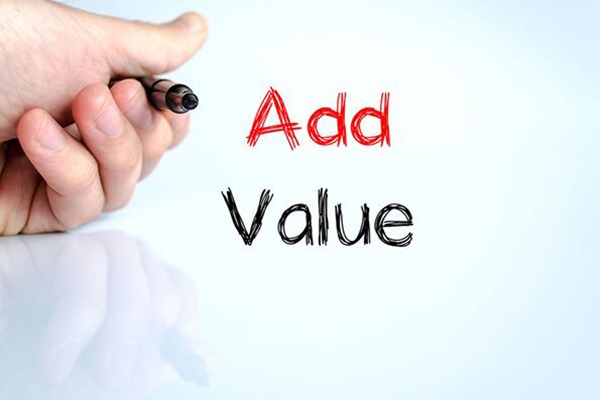
I feel like it is a blurred line at some points. The benefit of the radio in traditional forms is you can have a lot of audience interaction. Things are going because it’s a live show. There are a lot of podcasts that have live shows and live recordings. They put them up for people to read after. The value of podcasting, too, is you are able to craft a good story. You’re able to put in a lot of interesting things and ways for people to read about different topics. The power of podcasting is that when it gets down to it, anybody can do it. It’s not as crazy as some people make it out to be. There are easy ways to come in, find that niche, find a topic that you’re passionate about, and you’re surprised by it. How many other people out there are passionate about that as well? There’s such a little lower barrier to entry than starting a radio program or doing something like that. The benefit of it is you get many different voices. People are finding their ways and even people trying to find new ways to get people. It’s an interesting medium that has a lot of potentials. It’s been around for a while, especially in the last couple of years, it’s taken off.
A guest asked me, “Can’t that happen on the radio as well?” I find that podcasting is a lot easier entry. You can start a podcast in your own kitchen table with a set of iPhone headphones, a laptop computer, and an internet connection. It can be as large or as small as you want to make it based on your passion for the medium. As your show becomes bigger, you can always invest in more equipment. For me, I’ve got the professional boom mic, radio microphone, high-end video camera, lighting and everything that goes with it because as my podcast grew, I spent more money on quality equipment. This is to make sure the sound was there and to make sure the lighting is better, but you don’t need to start off that way. It’s easy.
If you’ve got an idea, a passion, a voice, and a voice that you want to share. Creating a podcast can be something that you do five minutes a day. It could be five minutes a week that you’re on podcasting. You take that material, put it up online, away it goes and people either resonate with it or they don’t resonate with it. When you’re with a radio show, you’re committed to a weekly show. I’m committed for 2020 for a weekly show for fifteen minutes with guests and sponsors I’m committed to making sure that I’m speaking to a national audience. I’m also making sure that my show is live and mistakes happen in life. In podcasting, if you make a mistake, you re-record. That is where I see a lot of the big differences.
With podcasting, you’re able to take out snippets of the conversation and package them into even more valuable things for the audience. It’s also on-demand based on the audience, listener or viewer because we also do a video for our podcast. It’s on their time schedule as well, which is beneficial.
People can download my show. If people go to the website YourLivingBrand.live every Friday, you can download my episode on iHeartRadio, SoundCloud or on iTunes. Everything is available or you can subscribe to any of the three channels and be able to get a reminder. It will give you the latest greatest show. What it allows you to do is being able to take the snippets, especially if it’s video. Sit there and say, “This was 30 seconds of brilliance.” I can cut that 30 seconds of brilliance on video and be able to put it up on Facebook, Twitter, LinkedIn, Snapchat or wherever and be able to share with my customers. I can put it up on my website. There are lots of different ways where you can cut and copy and be able to repurpose information on a podcast where it’s not as easy to do it on a radio show. I can go in there, I can take my show and I cut it up into little pieces, but it’s a lot more effort to do it on an audio basis. It takes a lot more energy.
It's important to find that balance between preparedness, but also being able to be flexible and take the conversations as they go. Share on XA lot of it loses its relevance because it is only audio and it doesn’t have the video components. What it allows me to do is I’m now on a national platform. By being on K4HD radio, I’m on a national program. I’m syndicated coast to coast and into Canada. It gives me a much larger voice. It’s a lot easier for me. Both of them are great. It’s a matter of sitting there going, “What’s your passion?” I like the interaction. I love audience participation. I love the questions from the audience. I love the where are we going now type of thing and being able to pivot on the fly and that’s great. Tell me about your podcasting business because it’s not the show that you are doing, you are looking to turn this into a business where you can help other people become podcasters. How does that podcast help people promote their brand?
We’re looking at turning this into a platform that offers other brands an opportunity to get their message out there. That’s one thing about Adam and me on the show, specifically. We lead with authenticity. That’s the idea that you want to be authentic to who you are. Authenticity, if you’re doing it right, you’re being yourself. If you’re trying to fake it, people can see through that. It’s the idea with our Grow Like A Pro Show. We’re building it out where Adam and I are authentic people. We share our stories. We allow other people to share their stories. We’re like, “People want to know more about this information. They want to hear these stories and they want to get this information. Why not share a little bit of our expertise?” We’re not experts. We are constantly improving and we’re even thinking about doing a live show as well. Adding on that component, too. In terms of developing our Grow Like A Pro Show, we want it to be a community. We’re developing out where readers can come and read all of these amazing insights from these guests. Adam and I also do off-topic episodes where we talked about trending topics. We’ve done one on the bankruptcy with Toys “R” Us and what they’re doing to try to make a comeback. We’ve done one on how to start a podcast as well.
We want to create as much value as we can and deliver that to people. Sharing our expertise as we’re going through this process with other people is what we’re passionate about. Even helping people with finding the right equipment. Doing the editing production, potentially working with the brands and the guests that we’ve had on in doing a sponsorship spot. Eventually, we are looking at making this a community. It’s going to be a membership profile where previous guests and future guests are going to have access to our community. We’re going to call it the Grow Like A Pro All-Stars tentatively. It’s people who are recognized and people that are growing like a pro. Having that ability and platform like ours where we give people the opportunity to share their story, share what’s made them successful. How they’re learning to become even better, and then also having access to the community of amazing people. The listeners and the other previous guest are something we are trying and dedicating our time to build up.
When we started Grow Like A Pro, the idea was something that we’ve learned. Jason and I understand it a lot when you want to do business with someone you trust, you like and you can relate to. It’s a lot easier to relate to someone and relate to a story than it is to relate to a simple company. We want to give that platform for people that are doing incredible things in the community to have their story be heard. You asked about some of our bigger plans in this media network type of thing. It evolved into that way because when we started, the studio we’re in right now was a little office. We turned it into a studio where we could record all this stuff. After four or five of the guests that we’ve had on our show, we’re like, “I’ve always wanted to start a podcast. I’ve always wanted to do something and I don’t know how to do it.”
We thought we have such a valuable resource here as a studio. What can we do to help people in the community achieve their dreams and achieve their goals? We thought of this idea of having certain tiered levels or certain ideas of people can come in and record. Take their stuff that they’re expert at or they can come in and be a part of this network where we offer the services of marketing, SEO, editing, recording, post-production, and all this stuff. Also, to give people a chance to tell their stories, to be able to do it on their terms and achieve what they want without all the hassle and craziness of learning the business, if that’s what they desire.

The beautiful thing about podcasting and the radio show is it gives a medium that allows you to tell a story effectively. It gives you the ability to tell a story whether it’s a five, ten, twenty-minute story or an hour story and be able to have the ability to deep dive into a subject matter. Let people understand what you’re trying to convey, build your brand and build trust. That’s what the whole thing is about. The reason that you create a prop podcast, radio show, and blog is to be able to put yourself out there creatively in any way shape or form. To be able to let people inside your head and understand the value that you can provide to them. Also, to be able to tell your story in an effective way that’s compelling to them. It’s not about you. It’s not about you’re talking about me all the time, “Look how wonderful I am. Look at all the neat things I’m doing.” It’s about, “Let me tell you about some clients. Let me tell you a story. Let me give you some examples of some different things that are going to make your life better.”
Successful podcasters are the ones that make it relevant for their audience. if you can tell your story in a way that adds value to them, they’ll keep coming back. If it’s all about you all the time and if it’s using your own song sheet, nobody comes back. They may listen to you once, but they don’t listen to you time and time again. To be able for you to help these people, be creative and give them the tools to make it easier for them to say, “I’ve got an idea, but I don’t know what else to do or how else do it.” Be able to sit there and say, “We’ve got a package for you. Here’s how we can make this whole thing a reality simply,” because we built it all. It’s here and we can do this for you. People will trade money for convenience and for the ability to ramp up a lot more quickly. What are the ways that you help people? How do you help people start? One of the big questions you get from people that want to start a podcast that lets you know, “This is somebody that we can work with and this is somebody that we can help.”
The biggest thing that we like to do is be transparent with our processes. We let them know exactly what it takes to start a show. A lot of times people will say, “I need the best equipment right away. I need the best of everything.” That’s not the case because if you have the best equipment, but you’re talking about something that you don’t understand or you’re not a great speaker, it’s not going to matter how good your equipment is. We tell people, “You need to find the topic that you love and you’re passionate about. Find a friend or co-host that’s able to do that with you then understand what your message is, what your market is, who you want to speak to, and speak about.” Let them know that at how simple it is to get started. If you have a Mac, you can use GarageBand which is free. If you have Windows, you can download Audacity. You can use an iPhone and a microphone to get started. Something I tell people is, “Go out.” When Jason and I first met. The first thing that I want to do is go out to lunch with him and talk. You do an impromptu podcast like that.
You do a trial run and you get started. The biggest thing that I always tell people and talk to people about is you need not be afraid to take that first step. People have a fear of the unknown and of failing but you find some of the greatest successes when you are able to take that first step. You gain success, friends, allies, and experiences by not being afraid to take that chance. If nothing happens and if you stand still, it’s never going to happen. They’re people that have done it before. If you’re willing to open yourself up to it and open your eyes, there’s a lot of amazing things you can do. We try to tell people there are easy ways to get started and it’s not as crazy as you may think.
We love to start with a discovery process and build that relationship with people to get to know them. The idea that we always like to say starts with the low-hanging fruit. There’s a lot of people who are afraid to start. People come up to us even in the Columbus, Ohio area where we are based. They’re like, “You are so professional.” I was at a live event that we did for Grow Like A Pro in Nashville and some of the people came up to me. I’m like, “Thank you. I appreciate that.” I don’t want to diminish our expertise, but we like to kid ourselves. We don’t know what we’re doing. We’re experimenting as we go along. You learn to overcome the challenges that you’re facing as you go through the process.
If you're afraid to try and start, you're never going to get better at anything. Share on XThis is a process. We all get better. If you listened to my first episode in June 2017 and you listen to me now, it’s a completely different show. It’s more polished. The questions are better. The curiosity is better. You got to learn as you go. You got to understand that you start somewhere and you grow slowly. You grow as your audience grows and your audience grows with you. They help you along because they tell you what you’re doing right and they tell you what you’re doing wrong. They’re not afraid to let know which is a good thing. If you take that criticism, sit there and say, “Ben, we’d like to see you moving this direction.” If there are enough people that says that, that’s why you move forward. We were talking about everything to do with podcasting. Can’t you do this on the radio as well? You can but it’s a lot more challenging to get on the radio than it is to start a podcast.
Anybody can start a podcast truly. You can have an audience of one by yourself in your basement. Create a podcast and that podcast will grow. Few people will put you on the radio until you already have an audience. Until you’ve already proven yourself. Until you’ve already had a series of conversations and they’re comfortable with making sure that you’re going to be professional enough when you’re speaking on the radio from coast to coast. People are going to want to dial that. People are going to want to listen and that people are going to see the value. They want to see the progress before you move from a podcast to a radio show. It’s the next evolution. We talked about preparedness. Why do you research? Can’t you get the right information out of people out of an interview right in front of them? My viewpoint is unless you know a little bit about the person that you’re speaking to, how can you know how to ask those intelligent questions?
Luckily, it’s nice to have that team effort where one person is able to do that and the other person goes in a little more known. Even though I go in a lot of times not knowing everything you do, I want to have a little background about who you’re talking to and understand at least the industry they’re in. There’s a difference between asking the right questions to a person than asking them about an industry. You can understand the space there and be able to ask good questions about that. Being prepared is super important. I also am a super strong believer that a lot of the best-laid plans don’t go according to plan.
It’s great to understand that you can plan, you can prepare and you can spend all night studying everything about a person. When you get to the interview, you may not even talk about those things. You have to be able not to lock yourself into something and be so rigid. When you do that, it sounds way too formal, forced, and rehearsed. That’ll turn a lot of people off. It’s a tough balance. It’s easier said than done in some cases. It’s important to find that balance between preparedness but also being able to be flexible and take the conversations as they go.
The usual process we take is one of us will reach out or someone has reached out to us asking to be a guest on the show. Usually, we start with our framework. We have a list of around fifteen possible questions that we can pull is. We like to have those up in front of us during the interview. As the conversation unfolds, there are some people who are more comfortable behind the microphone. They’re more comfortable sharing a little bit about themselves and their story where we’ve had some guests and they’re like, “We do not feel comfortable at all being behind the mic. Can we have a printout of some of the possible questions?” I have a list of prepared answers. You got to do what’s comfortable for the guests. What we found is that we have a framework that we can draw and pull. Get more info if needed. In most cases on the guests that we have, we have those lists of prepared questions. We let it go where the conversation unfolds and goes. We did the same thing with you. We had a list of possible questions that we gave to you and we went down to it.
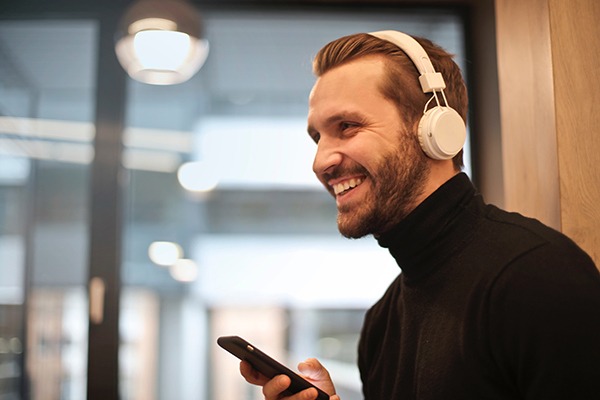
Did we get to any of those?
You gave roundabout answers to the majority of them. It’s the approach that we like. It’s organic. You ended the answer to your question and you’re like, “Let’s move on to the next one.” It’s an organic process like, “Ben, you shared about this particular topic that brings me to this question. I thought of it as you were saying.” You get into it. It’s organic. It flows well.
Jason and I have been doing this for a while and you’ve not been doing this for a long time. When you start off, a lot of times you have no idea what the heck you’re doing. Your stumbling in the dark when it comes to it. Something that I also love to tell people to embrace the failure and embrace the mistakes because that’s how you learn. There have been times where we’ve had recordings and we’ve had to re-record certain sessions. A camera will break or something goes wrong. Sometimes, that’s how you learn to be better. That’s how you learn to talk. You have conversations with people so the next time you talk to people, you take the experiences you learn from that. You can ask better questions and you can be aware of things that you weren’t before. Being able to embrace the possibility of failure and mistakes, allows you to learn, get better, and improve your craft. If you’re afraid to try and start, you’re never going to get better at anything.
How do you make people feel at ease? What do you do if you’ve got somebody that’s not a good interview? How do you draw stuff out of them? Give us simple tips that you may have.
I want you to be completely comfortable and we can even do a test if you like. I want you to treat this as friends around a table. We’re all friends here and there’s nothing serious. It’s not super regimented. No one’s going to judge you or anything. It’s a judge-free zone. What I say to everyone is, “You’re our friend when you’re here. This is casual. We can take breaks. We’ll get you water or whatever you need.” We want them to feel as if they’re a part of the family. If they’re coming home, it is when it boils down to it. The best podcasts are when you’re listening to people you can relate to, understand and you want to be friends with. The tactic that we’re trying to take is that, “You may not be the best at this, but everyone starts somewhere. We’re here to be your friend and help you through this. We’re going to do whatever we can to make you comfortable.”
We usually start the conversation, ten to twenty minutes. We are talking and making them feel comfortable before we start the recording. Once we start the recording, they’re already comfortable.
Are you going to create an eBook on how to create a podcast? That would be a great idea for you guys to have up online. If you’ve got one, send it to me and if not, it might be something to think about. Thank you for being on the show.
Thank you so much, Ben.
—
It has been a pleasure having Adam and Jason on the show. There were so many questions from the audience. We didn’t get all of them. What I’m going to do is I’m going to bring them up. I may send some of them over to Jason and Adam and see if they want to respond to a couple of the questions. They will be up in live on my show at www.YourLivingBrand.live Show. You’ll be able to download either on iHeart, iTunes, SoundCloud or whatever is your station of choice to be able to download those and be able to listen to it. There was a lot of great information on the pack. I want to let you guys know that my next guest is Alex Steele who’s going to be talking about alternative energy solutions. He has got some phenomenal information to give to you guys and he’s a great guest.
Important Links:
- Grow Like A Pro Show
- guest – Ben Baker as guest
- iHeartRadio – Your LIVING Brand Live Show
- SoundCloud – Your LIVING Brand Live Show
- iTunes – Your LIVING Brand Live Show
- GarageBand
- Audacity
- Alex Steele – next episode
About Adam Bankhurst
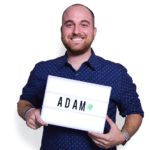 Adam was born in Cleveland, OH and graduated from The Fisher College of Business at The Ohio State University in 2010 with a degree in marketing. After college, he spent two years working in business development at a commercial real estate company in Florida before moving back to Columbus to be the IT Manager of The Basement Doctor for six years. He brings to Jenesis an extensive knowledge of marketing and IT strategies, a passion for events, fundraising, and a drive to help businesses grow and achieve all their dreams.
Adam was born in Cleveland, OH and graduated from The Fisher College of Business at The Ohio State University in 2010 with a degree in marketing. After college, he spent two years working in business development at a commercial real estate company in Florida before moving back to Columbus to be the IT Manager of The Basement Doctor for six years. He brings to Jenesis an extensive knowledge of marketing and IT strategies, a passion for events, fundraising, and a drive to help businesses grow and achieve all their dreams.
Adam is also a writer for the video game and entertainment website IGN.com and founded a charity movement, Extra Life Columbus, that raises money for Nationwide Children’s Hospital and has raised over $150,000 in the past five years. He loves the Cleveland Browns and always believes this will be their year. He also loves his family and friends, Disney, Star Wars, traveling, Chipotle, and Nintendo. He has a beautiful Wife, Betsy, and an awesome cat named Winnie.
About Jason Fleagle
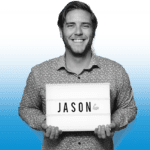 Jason Fleagle is the Founder of the international blogging platform ConvergeBlog.com, the Founder of the brand success consulting company CatalystGrowthGroup.com, and the Director of Content Marketing with Motava.com. Jason has worked with brands like The John Maxwell Company, Ziglar Inc., Ziglar Family, Kevin Harrington from Shark Tank, The Basement Doctor, Autism Power, the BBB, political think tanks, startups, and many others.
Jason Fleagle is the Founder of the international blogging platform ConvergeBlog.com, the Founder of the brand success consulting company CatalystGrowthGroup.com, and the Director of Content Marketing with Motava.com. Jason has worked with brands like The John Maxwell Company, Ziglar Inc., Ziglar Family, Kevin Harrington from Shark Tank, The Basement Doctor, Autism Power, the BBB, political think tanks, startups, and many others.
In his past, Jason has helped lead the strategic ideation, planning, management, and leadership of large multi-million dollar projects all the way down to projects for solopreneurs. One of the largest projects Jason had the opportunity to work on is co-creating the Secrets of Closing the Sale Masterclass with Kevin Harrington and Ziglar Inc., which became one of the most successful online course launches of 2018.
Love the show? Subscribe, rate, review, and share!

